Legal Analysis: Formula Factors' Employment Contract Breach Case Study
VerifiedAdded on 2021/11/12
|6
|1793
|48
Case Study
AI Summary
This case study examines a legal dispute arising from a breach of an employment contract. The central issue revolves around whether an employee, George, can circumvent a non-compete clause by establishing a new company to compete with his former employer, Formula Factors. The analysis delves into the concept of separate legal personality, as established in Salomon v A Salomon & Co. Ltd, and its implications for the case. The solution considers whether the corporate veil should be pierced to hold George personally liable for the actions of the new company, which was formed to evade the restraint clause. The study explores relevant case laws, including Gilford Motor Co Ltd v Horne and Donnelly v Edelsten, to determine the validity of the non-compete clause and the circumstances under which the court might disregard the separate legal entity. The conclusion favors Formula Factors, arguing that George's actions constitute a breach of contract and that the corporate veil should be pierced, holding him responsible for his actions. The analysis provides a detailed application of the law to the facts, supported by relevant legal precedents.
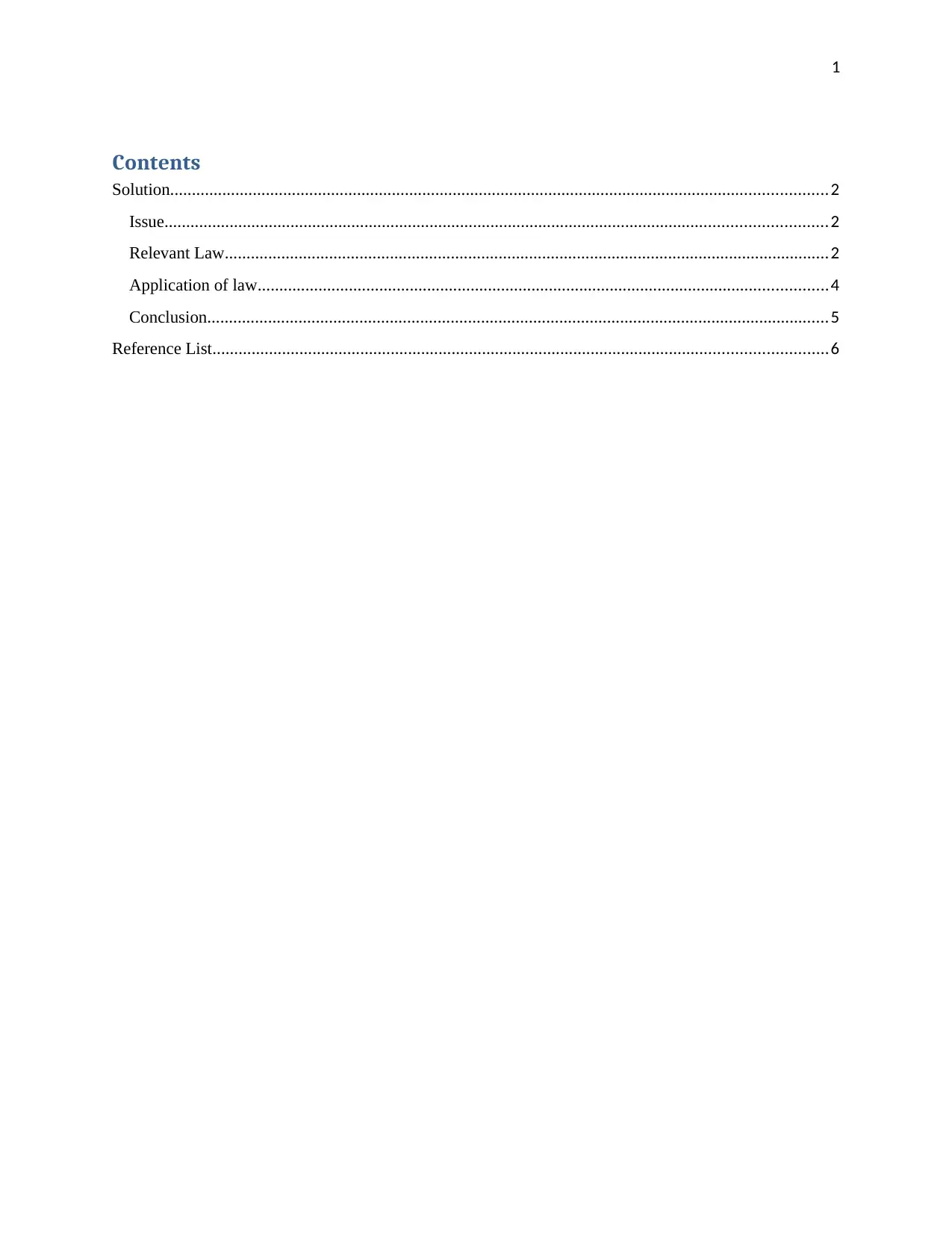
1
Contents
Solution.......................................................................................................................................................2
Issue........................................................................................................................................................2
Relevant Law...........................................................................................................................................2
Application of law...................................................................................................................................4
Conclusion...............................................................................................................................................5
Reference List.............................................................................................................................................6
Contents
Solution.......................................................................................................................................................2
Issue........................................................................................................................................................2
Relevant Law...........................................................................................................................................2
Application of law...................................................................................................................................4
Conclusion...............................................................................................................................................5
Reference List.............................................................................................................................................6
Paraphrase This Document
Need a fresh take? Get an instant paraphrase of this document with our AI Paraphraser
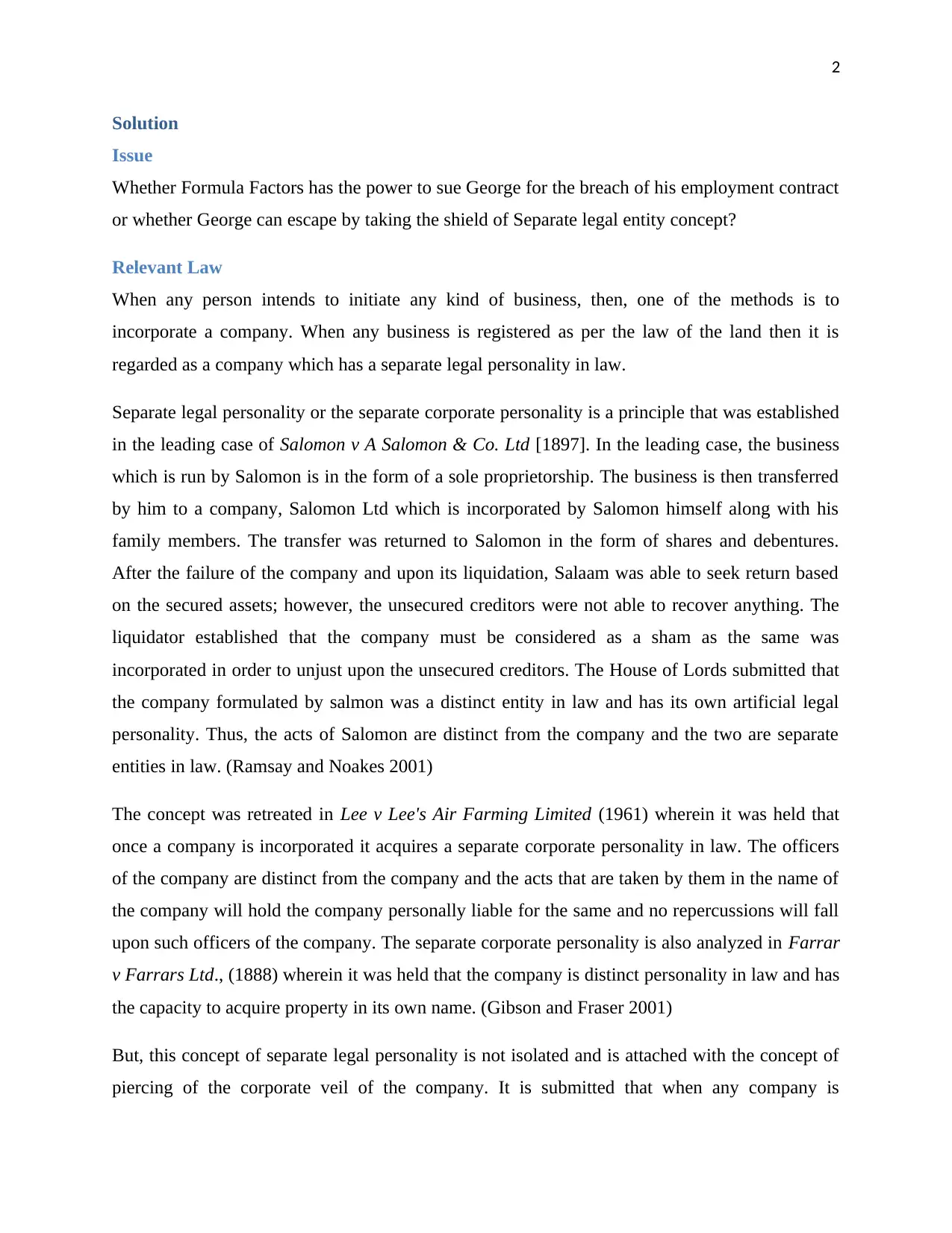
2
Solution
Issue
Whether Formula Factors has the power to sue George for the breach of his employment contract
or whether George can escape by taking the shield of Separate legal entity concept?
Relevant Law
When any person intends to initiate any kind of business, then, one of the methods is to
incorporate a company. When any business is registered as per the law of the land then it is
regarded as a company which has a separate legal personality in law.
Separate legal personality or the separate corporate personality is a principle that was established
in the leading case of Salomon v A Salomon & Co. Ltd [1897]. In the leading case, the business
which is run by Salomon is in the form of a sole proprietorship. The business is then transferred
by him to a company, Salomon Ltd which is incorporated by Salomon himself along with his
family members. The transfer was returned to Salomon in the form of shares and debentures.
After the failure of the company and upon its liquidation, Salaam was able to seek return based
on the secured assets; however, the unsecured creditors were not able to recover anything. The
liquidator established that the company must be considered as a sham as the same was
incorporated in order to unjust upon the unsecured creditors. The House of Lords submitted that
the company formulated by salmon was a distinct entity in law and has its own artificial legal
personality. Thus, the acts of Salomon are distinct from the company and the two are separate
entities in law. (Ramsay and Noakes 2001)
The concept was retreated in Lee v Lee's Air Farming Limited (1961) wherein it was held that
once a company is incorporated it acquires a separate corporate personality in law. The officers
of the company are distinct from the company and the acts that are taken by them in the name of
the company will hold the company personally liable for the same and no repercussions will fall
upon such officers of the company. The separate corporate personality is also analyzed in Farrar
v Farrars Ltd., (1888) wherein it was held that the company is distinct personality in law and has
the capacity to acquire property in its own name. (Gibson and Fraser 2001)
But, this concept of separate legal personality is not isolated and is attached with the concept of
piercing of the corporate veil of the company. It is submitted that when any company is
Solution
Issue
Whether Formula Factors has the power to sue George for the breach of his employment contract
or whether George can escape by taking the shield of Separate legal entity concept?
Relevant Law
When any person intends to initiate any kind of business, then, one of the methods is to
incorporate a company. When any business is registered as per the law of the land then it is
regarded as a company which has a separate legal personality in law.
Separate legal personality or the separate corporate personality is a principle that was established
in the leading case of Salomon v A Salomon & Co. Ltd [1897]. In the leading case, the business
which is run by Salomon is in the form of a sole proprietorship. The business is then transferred
by him to a company, Salomon Ltd which is incorporated by Salomon himself along with his
family members. The transfer was returned to Salomon in the form of shares and debentures.
After the failure of the company and upon its liquidation, Salaam was able to seek return based
on the secured assets; however, the unsecured creditors were not able to recover anything. The
liquidator established that the company must be considered as a sham as the same was
incorporated in order to unjust upon the unsecured creditors. The House of Lords submitted that
the company formulated by salmon was a distinct entity in law and has its own artificial legal
personality. Thus, the acts of Salomon are distinct from the company and the two are separate
entities in law. (Ramsay and Noakes 2001)
The concept was retreated in Lee v Lee's Air Farming Limited (1961) wherein it was held that
once a company is incorporated it acquires a separate corporate personality in law. The officers
of the company are distinct from the company and the acts that are taken by them in the name of
the company will hold the company personally liable for the same and no repercussions will fall
upon such officers of the company. The separate corporate personality is also analyzed in Farrar
v Farrars Ltd., (1888) wherein it was held that the company is distinct personality in law and has
the capacity to acquire property in its own name. (Gibson and Fraser 2001)
But, this concept of separate legal personality is not isolated and is attached with the concept of
piercing of the corporate veil of the company. It is submitted that when any company is
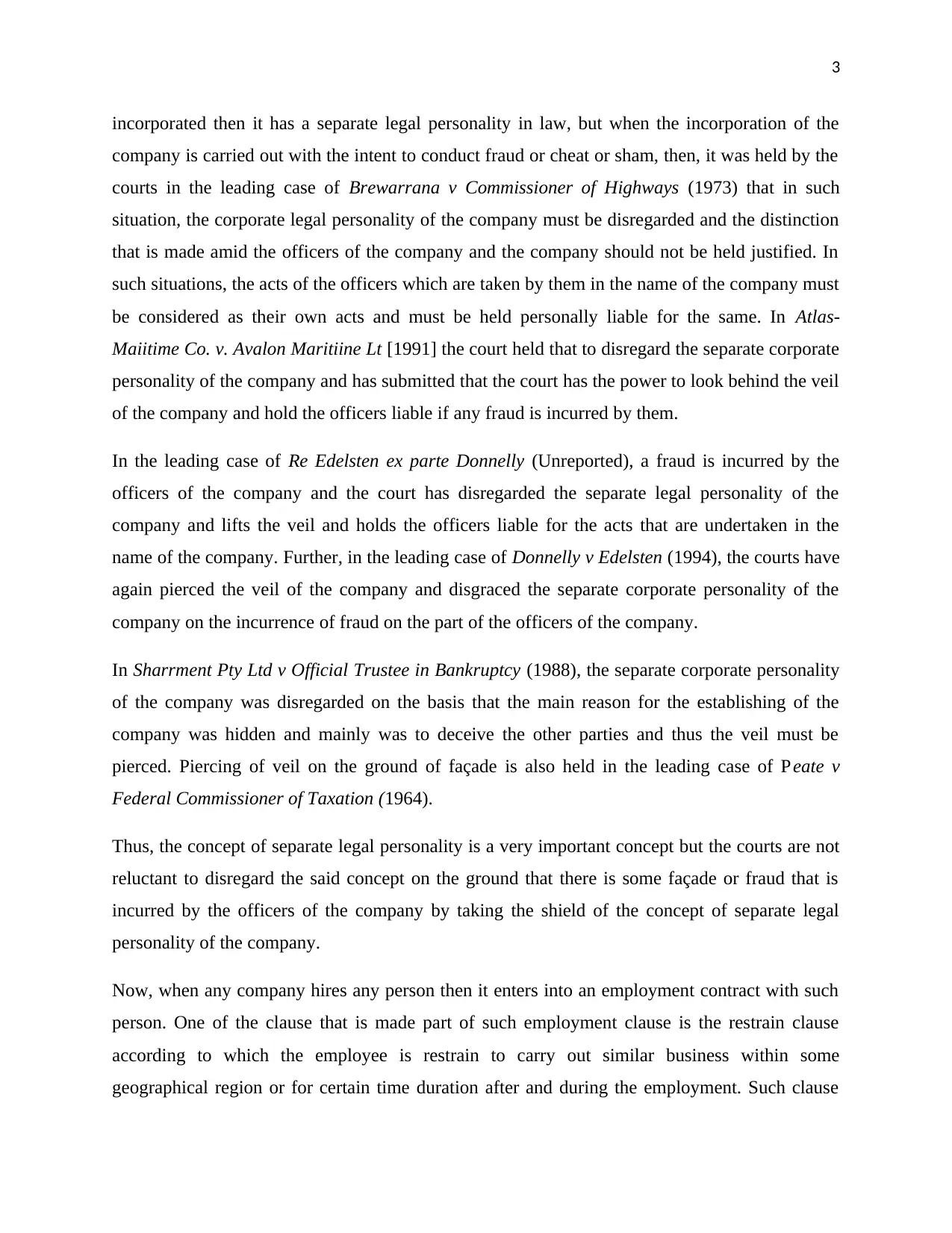
3
incorporated then it has a separate legal personality in law, but when the incorporation of the
company is carried out with the intent to conduct fraud or cheat or sham, then, it was held by the
courts in the leading case of Brewarrana v Commissioner of Highways (1973) that in such
situation, the corporate legal personality of the company must be disregarded and the distinction
that is made amid the officers of the company and the company should not be held justified. In
such situations, the acts of the officers which are taken by them in the name of the company must
be considered as their own acts and must be held personally liable for the same. In Atlas-
Maiitime Co. v. Avalon Maritiine Lt [1991] the court held that to disregard the separate corporate
personality of the company and has submitted that the court has the power to look behind the veil
of the company and hold the officers liable if any fraud is incurred by them.
In the leading case of Re Edelsten ex parte Donnelly (Unreported), a fraud is incurred by the
officers of the company and the court has disregarded the separate legal personality of the
company and lifts the veil and holds the officers liable for the acts that are undertaken in the
name of the company. Further, in the leading case of Donnelly v Edelsten (1994), the courts have
again pierced the veil of the company and disgraced the separate corporate personality of the
company on the incurrence of fraud on the part of the officers of the company.
In Sharrment Pty Ltd v Official Trustee in Bankruptcy (1988), the separate corporate personality
of the company was disregarded on the basis that the main reason for the establishing of the
company was hidden and mainly was to deceive the other parties and thus the veil must be
pierced. Piercing of veil on the ground of façade is also held in the leading case of Peate v
Federal Commissioner of Taxation (1964).
Thus, the concept of separate legal personality is a very important concept but the courts are not
reluctant to disregard the said concept on the ground that there is some façade or fraud that is
incurred by the officers of the company by taking the shield of the concept of separate legal
personality of the company.
Now, when any company hires any person then it enters into an employment contract with such
person. One of the clause that is made part of such employment clause is the restrain clause
according to which the employee is restrain to carry out similar business within some
geographical region or for certain time duration after and during the employment. Such clause
incorporated then it has a separate legal personality in law, but when the incorporation of the
company is carried out with the intent to conduct fraud or cheat or sham, then, it was held by the
courts in the leading case of Brewarrana v Commissioner of Highways (1973) that in such
situation, the corporate legal personality of the company must be disregarded and the distinction
that is made amid the officers of the company and the company should not be held justified. In
such situations, the acts of the officers which are taken by them in the name of the company must
be considered as their own acts and must be held personally liable for the same. In Atlas-
Maiitime Co. v. Avalon Maritiine Lt [1991] the court held that to disregard the separate corporate
personality of the company and has submitted that the court has the power to look behind the veil
of the company and hold the officers liable if any fraud is incurred by them.
In the leading case of Re Edelsten ex parte Donnelly (Unreported), a fraud is incurred by the
officers of the company and the court has disregarded the separate legal personality of the
company and lifts the veil and holds the officers liable for the acts that are undertaken in the
name of the company. Further, in the leading case of Donnelly v Edelsten (1994), the courts have
again pierced the veil of the company and disgraced the separate corporate personality of the
company on the incurrence of fraud on the part of the officers of the company.
In Sharrment Pty Ltd v Official Trustee in Bankruptcy (1988), the separate corporate personality
of the company was disregarded on the basis that the main reason for the establishing of the
company was hidden and mainly was to deceive the other parties and thus the veil must be
pierced. Piercing of veil on the ground of façade is also held in the leading case of Peate v
Federal Commissioner of Taxation (1964).
Thus, the concept of separate legal personality is a very important concept but the courts are not
reluctant to disregard the said concept on the ground that there is some façade or fraud that is
incurred by the officers of the company by taking the shield of the concept of separate legal
personality of the company.
Now, when any company hires any person then it enters into an employment contract with such
person. One of the clause that is made part of such employment clause is the restrain clause
according to which the employee is restrain to carry out similar business within some
geographical region or for certain time duration after and during the employment. Such clause
⊘ This is a preview!⊘
Do you want full access?
Subscribe today to unlock all pages.

Trusted by 1+ million students worldwide
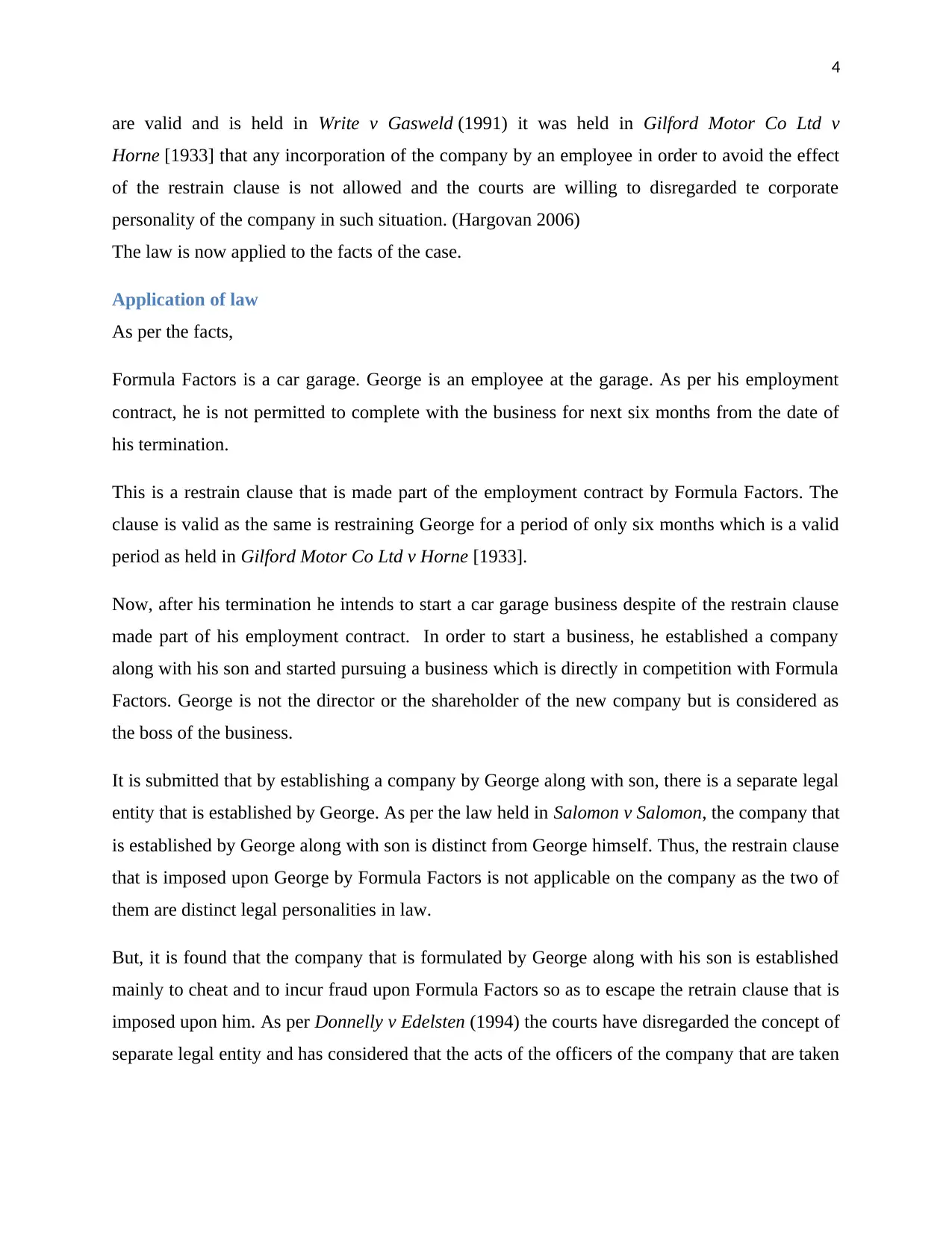
4
are valid and is held in Write v Gasweld (1991) it was held in Gilford Motor Co Ltd v
Horne [1933] that any incorporation of the company by an employee in order to avoid the effect
of the restrain clause is not allowed and the courts are willing to disregarded te corporate
personality of the company in such situation. (Hargovan 2006)
The law is now applied to the facts of the case.
Application of law
As per the facts,
Formula Factors is a car garage. George is an employee at the garage. As per his employment
contract, he is not permitted to complete with the business for next six months from the date of
his termination.
This is a restrain clause that is made part of the employment contract by Formula Factors. The
clause is valid as the same is restraining George for a period of only six months which is a valid
period as held in Gilford Motor Co Ltd v Horne [1933].
Now, after his termination he intends to start a car garage business despite of the restrain clause
made part of his employment contract. In order to start a business, he established a company
along with his son and started pursuing a business which is directly in competition with Formula
Factors. George is not the director or the shareholder of the new company but is considered as
the boss of the business.
It is submitted that by establishing a company by George along with son, there is a separate legal
entity that is established by George. As per the law held in Salomon v Salomon, the company that
is established by George along with son is distinct from George himself. Thus, the restrain clause
that is imposed upon George by Formula Factors is not applicable on the company as the two of
them are distinct legal personalities in law.
But, it is found that the company that is formulated by George along with his son is established
mainly to cheat and to incur fraud upon Formula Factors so as to escape the retrain clause that is
imposed upon him. As per Donnelly v Edelsten (1994) the courts have disregarded the concept of
separate legal entity and has considered that the acts of the officers of the company that are taken
are valid and is held in Write v Gasweld (1991) it was held in Gilford Motor Co Ltd v
Horne [1933] that any incorporation of the company by an employee in order to avoid the effect
of the restrain clause is not allowed and the courts are willing to disregarded te corporate
personality of the company in such situation. (Hargovan 2006)
The law is now applied to the facts of the case.
Application of law
As per the facts,
Formula Factors is a car garage. George is an employee at the garage. As per his employment
contract, he is not permitted to complete with the business for next six months from the date of
his termination.
This is a restrain clause that is made part of the employment contract by Formula Factors. The
clause is valid as the same is restraining George for a period of only six months which is a valid
period as held in Gilford Motor Co Ltd v Horne [1933].
Now, after his termination he intends to start a car garage business despite of the restrain clause
made part of his employment contract. In order to start a business, he established a company
along with his son and started pursuing a business which is directly in competition with Formula
Factors. George is not the director or the shareholder of the new company but is considered as
the boss of the business.
It is submitted that by establishing a company by George along with son, there is a separate legal
entity that is established by George. As per the law held in Salomon v Salomon, the company that
is established by George along with son is distinct from George himself. Thus, the restrain clause
that is imposed upon George by Formula Factors is not applicable on the company as the two of
them are distinct legal personalities in law.
But, it is found that the company that is formulated by George along with his son is established
mainly to cheat and to incur fraud upon Formula Factors so as to escape the retrain clause that is
imposed upon him. As per Donnelly v Edelsten (1994) the courts have disregarded the concept of
separate legal entity and has considered that the acts of the officers of the company that are taken
Paraphrase This Document
Need a fresh take? Get an instant paraphrase of this document with our AI Paraphraser
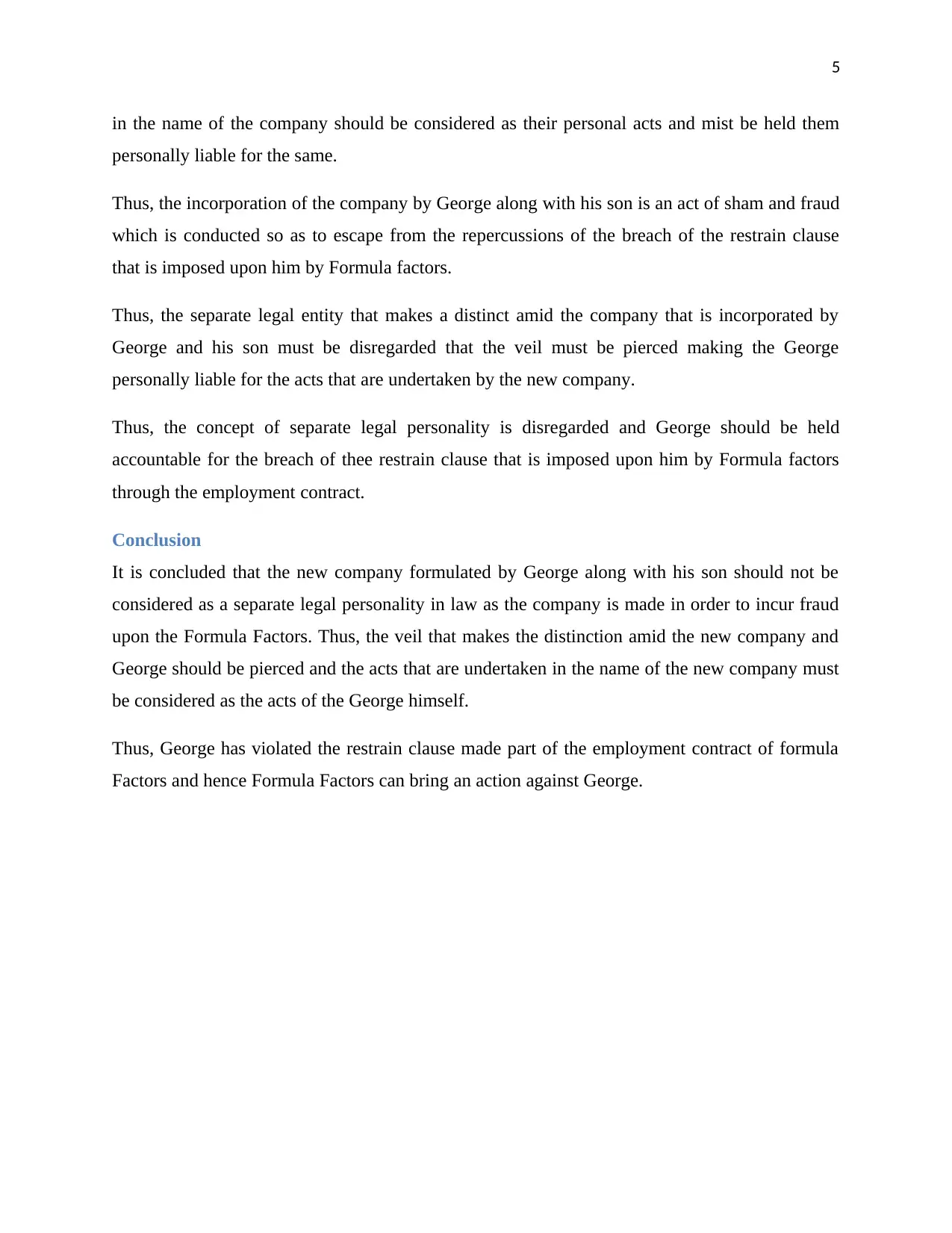
5
in the name of the company should be considered as their personal acts and mist be held them
personally liable for the same.
Thus, the incorporation of the company by George along with his son is an act of sham and fraud
which is conducted so as to escape from the repercussions of the breach of the restrain clause
that is imposed upon him by Formula factors.
Thus, the separate legal entity that makes a distinct amid the company that is incorporated by
George and his son must be disregarded that the veil must be pierced making the George
personally liable for the acts that are undertaken by the new company.
Thus, the concept of separate legal personality is disregarded and George should be held
accountable for the breach of thee restrain clause that is imposed upon him by Formula factors
through the employment contract.
Conclusion
It is concluded that the new company formulated by George along with his son should not be
considered as a separate legal personality in law as the company is made in order to incur fraud
upon the Formula Factors. Thus, the veil that makes the distinction amid the new company and
George should be pierced and the acts that are undertaken in the name of the new company must
be considered as the acts of the George himself.
Thus, George has violated the restrain clause made part of the employment contract of formula
Factors and hence Formula Factors can bring an action against George.
in the name of the company should be considered as their personal acts and mist be held them
personally liable for the same.
Thus, the incorporation of the company by George along with his son is an act of sham and fraud
which is conducted so as to escape from the repercussions of the breach of the restrain clause
that is imposed upon him by Formula factors.
Thus, the separate legal entity that makes a distinct amid the company that is incorporated by
George and his son must be disregarded that the veil must be pierced making the George
personally liable for the acts that are undertaken by the new company.
Thus, the concept of separate legal personality is disregarded and George should be held
accountable for the breach of thee restrain clause that is imposed upon him by Formula factors
through the employment contract.
Conclusion
It is concluded that the new company formulated by George along with his son should not be
considered as a separate legal personality in law as the company is made in order to incur fraud
upon the Formula Factors. Thus, the veil that makes the distinction amid the new company and
George should be pierced and the acts that are undertaken in the name of the new company must
be considered as the acts of the George himself.
Thus, George has violated the restrain clause made part of the employment contract of formula
Factors and hence Formula Factors can bring an action against George.
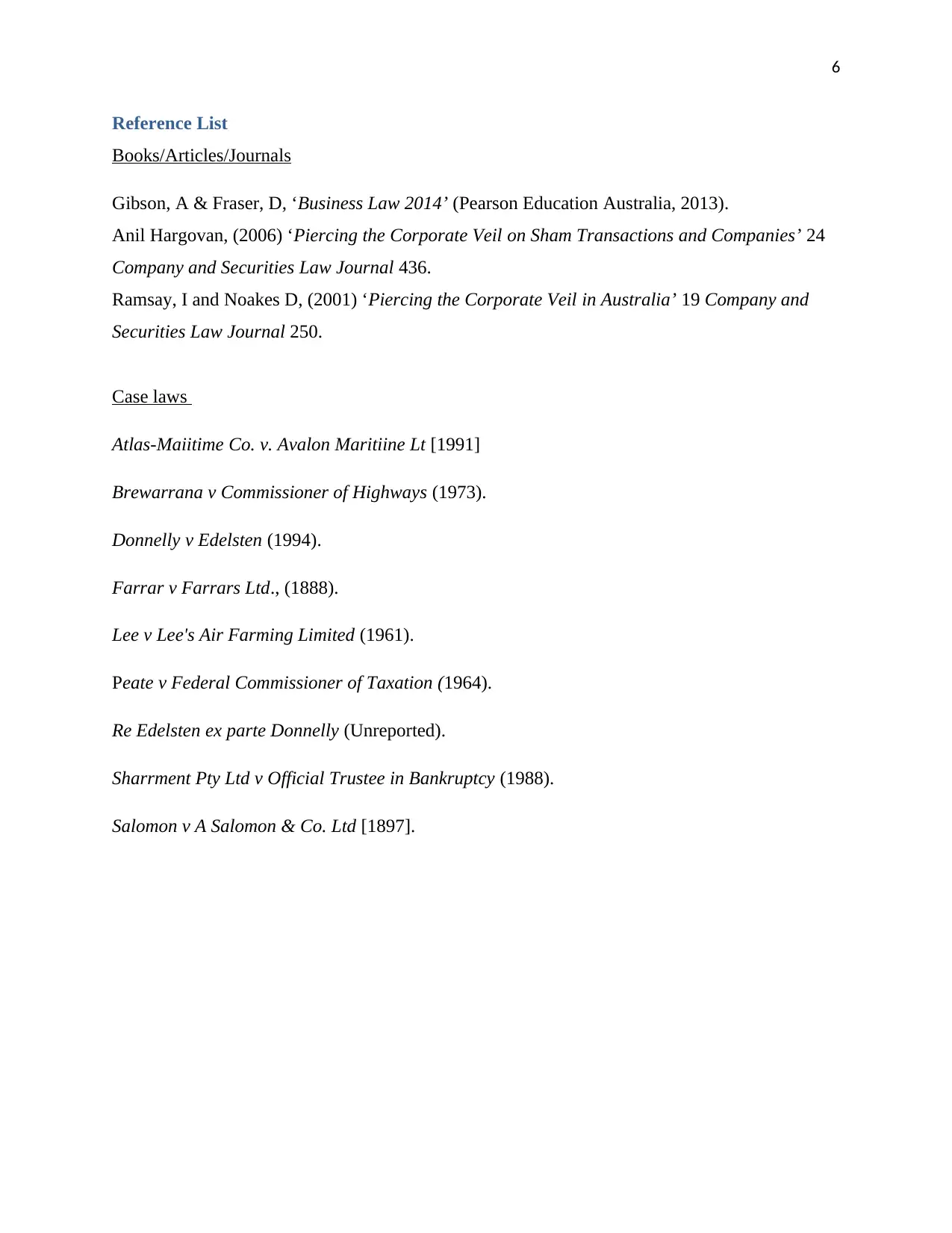
6
Reference List
Books/Articles/Journals
Gibson, A & Fraser, D, ‘Business Law 2014’ (Pearson Education Australia, 2013).
Anil Hargovan, (2006) ‘Piercing the Corporate Veil on Sham Transactions and Companies’ 24
Company and Securities Law Journal 436.
Ramsay, I and Noakes D, (2001) ‘Piercing the Corporate Veil in Australia’ 19 Company and
Securities Law Journal 250.
Case laws
Atlas-Maiitime Co. v. Avalon Maritiine Lt [1991]
Brewarrana v Commissioner of Highways (1973).
Donnelly v Edelsten (1994).
Farrar v Farrars Ltd., (1888).
Lee v Lee's Air Farming Limited (1961).
Peate v Federal Commissioner of Taxation (1964).
Re Edelsten ex parte Donnelly (Unreported).
Sharrment Pty Ltd v Official Trustee in Bankruptcy (1988).
Salomon v A Salomon & Co. Ltd [1897].
Reference List
Books/Articles/Journals
Gibson, A & Fraser, D, ‘Business Law 2014’ (Pearson Education Australia, 2013).
Anil Hargovan, (2006) ‘Piercing the Corporate Veil on Sham Transactions and Companies’ 24
Company and Securities Law Journal 436.
Ramsay, I and Noakes D, (2001) ‘Piercing the Corporate Veil in Australia’ 19 Company and
Securities Law Journal 250.
Case laws
Atlas-Maiitime Co. v. Avalon Maritiine Lt [1991]
Brewarrana v Commissioner of Highways (1973).
Donnelly v Edelsten (1994).
Farrar v Farrars Ltd., (1888).
Lee v Lee's Air Farming Limited (1961).
Peate v Federal Commissioner of Taxation (1964).
Re Edelsten ex parte Donnelly (Unreported).
Sharrment Pty Ltd v Official Trustee in Bankruptcy (1988).
Salomon v A Salomon & Co. Ltd [1897].
⊘ This is a preview!⊘
Do you want full access?
Subscribe today to unlock all pages.

Trusted by 1+ million students worldwide
1 out of 6
Related Documents
Your All-in-One AI-Powered Toolkit for Academic Success.
+13062052269
info@desklib.com
Available 24*7 on WhatsApp / Email
![[object Object]](/_next/static/media/star-bottom.7253800d.svg)
Unlock your academic potential
Copyright © 2020–2026 A2Z Services. All Rights Reserved. Developed and managed by ZUCOL.





